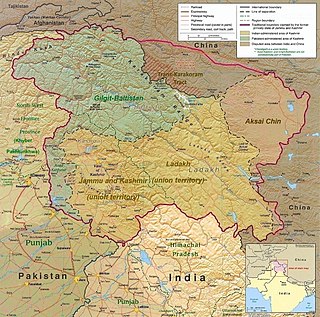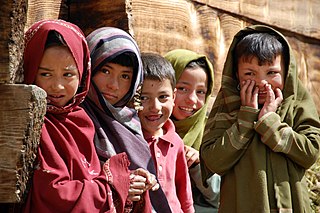
Muhammad al-Baqir full name Muhammad bin 'Ali bin al-Husayn bin Ali bin Abi Talib, also known as Abu Ja'far or simply al-Baqir (677-733) was the fifth Imam in Shia Islam, succeeding his father Zayn al-Abidin and succeeded by his son Ja'far al-Sadiq. His mother, Fatima Umm abdallah, was the daughter of the second Shia imam, Hasan ibn Ali. So he was the first Imam descended from both grandsons of Muhammad: Hasan ibn Ali and Husayn ibn Ali.

Baltistan, also known as Baltiyul or Little Tibet, is a mountainous region in Gilgit-Baltistan, Pakistan-administered Kashmir. It is located near the Karakoram mountains just south of K2, and borders Gilgit to the west, China's Xinjiang to the north, Ladakh to the southeast, and the Kashmir Valley to the southwest. Its average altitude is over 3,350 metres (10,990 ft).

The Balti people or Baltis are an ethnic group of Dardic-admixed Tibetan descent who are native to the Pakistani-administered territory of Gilgit−Baltistan. They are also found in the Indian-administered territory of Ladakh—predominantly in the Kargil district with smaller concentrations present in the Leh district. Outside of the greater Kashmir region, Baltis are scattered throughout Pakistan, with the majority inhabiting prominent urban centres such as Lahore, Karachi, Islamabad and Rawalpindi.
Rashīd Aḥmad ibn Hidāyat Aḥmad Ayyūbī Anṣārī Gangohī was an Indian Deobandi Islamic scholar, a leading figure of the Deobandi jurist and scholar of hadith. His lineage reaches back to Abu Ayyub al-Ansari.

Darul Uloom Nadwatul Ulama translated to English as House of Knowledge & Assembly of Scholars University is an Islamic institution & University at Lucknow, India.

Muḥammad Zakarīyā ibn Muḥammad Yaḥyá Ṣiddīqī Kāndhlawī Sahāranpūrī Muhājir Madanī was a Sunni Hanafi Hadith scholar of the Deobandi school of Islamic thought in India, popularly known as a "Hazrat Shaykh al-Hadith" and an influential ideologue of Tablighi Jamaat, the missionary and reform movement founded by his uncle Maulana Muhammad Ilyas. His notable works are Awjaz al-Masalik, an Arabic commentary in six volumes on Imam Malik's Muwatta, and Khasa'il-i Nabawi, an Urdu translation and commentary on Imam at-Tirmidhi's Shama'il.
The Naqshbandi Golden Chain is a lineage of spiritual masters of the Naqshbandi Sufi order related to each other going back to the Islamic prophet Muhammad. It is a chain in which each scholar was given ijazah or permission for dhikr of God by his own teacher or pir to transmit the knowledge he had received to the next generation of students in the traditional manner of Sufi transmission.

Shaikh Muhammad Hussain Najafi is a Pakistani Twelver Shia Marja. At the present there are three maraji of Pakistani descent, the first one is Basheer Hussain Najafi, second one is Hafiz Syed Riaz Hussain Najafi and the third is he himself. As Basheer Hussain Najafi has chosen to reside in Najaf, Iraq, Muhammad Hussain Najafi and Syed Riaz Hussain Najafi are the only marja in Pakistan. He is running Hawza in Sargodha.
He has been included in the last 5 editions of "The Muslim 500: The World's Most Influential Muslims" since 2010. He is one of the 9 marja's mentioned in the most recent edition.

Yugo (Yugu) is a small village with a population of more than 6,000 people in the Ghanche district of Baltistan, Gilgit-Baltistan, Pakistan. The village is located above the Shyok River 75 km from Baltistan's capital Skardu on a tarmac highway heading towards Khaplu after passing Ghawari and Kunes. Yugo is situated adjacent to the geographically important village of Kharfak which boasts of a high-altitude mountain lake, Lake Kharfak. Khaplu which is Ghanche district's administrative capital lies a further 25 km away from Yugo.

Syed Shuja’at Ali Qadri was the first Grand Mufti of Pakistan, Judge of Federal Shariat Court, a member of the Pakistani Council of Islamic Ideology and a scholar of Islamic Sciences and modern science. He was influenced by Mustafa Raza Khan Qadri.
Third Expedition of Wadi al Qura, also known as the Campaign of Wadi al Qura or Ghazwah of Wadi al Qura took place in June 628 AD, 2nd month of 7AH, of the Islamic calendar.

Khawaja Muhammad Zaman of Luari was a sufi saint and poet from Sindh. His father, Shaikh Abdul Latif Siddiqi, was a descendant of first Rashidun Caliph Abu Bakr. Their forefathers had moved to Sindh in Abbasid era.

Moulana Abdul Hamid Qadri Badayuni was a traditional Islamic scholar, Sufi master, poet, and leader from Pakistan. He was the founder of the Islamic college Jamia-Talimat-e-Islamiya located in Karachi.
Tuhaf al-Uqul is a hadith book written by Abu Muhammad al-Hasan bin Ali bin al-Husain bin Shu’ba al-Harrani. He is one of the Shia Islam scholars in the fourth century of Hijrah.
Shah Abdul Qadir Raipuri شاہ عبد القادر رائے پوری was a spiritual reformer and well known guide of Islam.
Abul Wafa Sanaullah Amritsari was a British Indian, later Pakistani, Muslim scholar and a leading figure within the Ahl-e-Hadith movement who was active in the Punjab city of Amritsar. He was also a major antagonist of Mirza Ghulam Ahmad and the early Ahmadiya movement. Sanaullah Amritsari served as the general secretary of Markazi Jamiat Ahle Hadith Hind from 1906 to 1947 and was the editor of the Ahl-e-Hadees magazine. Born into a family of Kashmiri descent of sapru clan, he moved to Pakistan at the Partition, losing his son in the process, and himself dying in Sargodha, Punjab, Pakistan, in 1948, after suffering from a stroke.
Muhammad Waqaruddin Qadri (1915-93) was an Islamic scholar associated with the Sunni Barelvi movement of south Asia. His fatawa (rulings) are compiled in three volume of the book titled Waqar-ul-Fatawa. He taught and administered in Islamic institutes in India, Bangladesh and later in Pakistan. He was conferred title of Mufti-e-Azam Pakistan during Zia-ul Haq regime.









